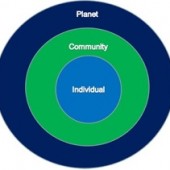In 1999, the National Association of Social Workers (NASW) in the United States published a policy statement on the environment that acknowledged the social work profession’s apparent “lack of interest” in environmental issues, and called for a new urgency among social workers to address the challenges of pollution, environmental contamination, and resource depletion. Despite this call for urgency and the increasing certainty of widespread social and environmental crises due to climate change, the integration of ecological concepts into mainstream social work education and practice has been slow and sporadic. Only recently have some social workers begun to openly discuss a re-centering of social work within a sustainability paradigm, emphasizing the importance of interconnectedness among humans and the natural world, interdisciplinary alliances and partnerships, and holistic justice-focused practice. This paper explores the potential for a case study assignment in a Master of Social Work (MSW) program to help make explicit connections between sustainability concepts introduced in the classroom and the practical application of these concepts in a wide range of social work practice settings. Three sample case studies from students are presented, and advantages and challenges of this pedagogical approach are discussed.
Continue Reading
To most individuals, sustainability means environmentalism. This unfortunate approach to the current global crisis has ignored a more realistic systems approach, that sustainability includes social, cultural, economic, individual, and technical components. Even more tragic is our inability to align our very admirable values related to sustainability with our demonstrated and often
unenlightened self-interest and partisan selfishness, for it is individual behavior that creates the foundation for action in all other contexts in sustainability and potentially guides our ability to work with one another to make life-affirming decisions. This paper addresses the tragic gap between what we profess to value and the collective behaviors we demonstrate.
Continue Reading
A systems theory approach to sustainability in five contexts—social/cultural, economic, environmental, technical, and individual—is a realistic and useful approach to researching and teaching sustainability in the university. As a springboard for social change, the university needs to develop values-based sustainability content for classes across disciplines, and especially address the careful assessment and evaluation of both human and technical factors for solving sustainability problems.
Continue Reading